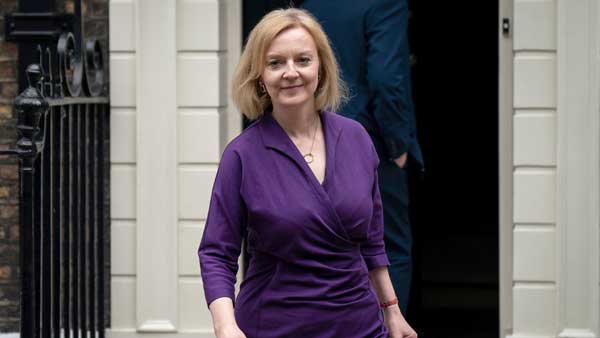Since the mini-budget announcements by Kwarteng the UK has seen a spike in interest rates, a drop in the value of the pound and a resumption of gilt buying by the Bank of England.
London: Liz Truss has had a baptism by fire during her first weeks of UK premiership, but the PM is sticking to her script and her Chancellor. A script that Liz Truss and Kwasi Kwarteng have been rehearsing for years. In 2011, they co-authored a book, After the Coalition, about the future direction of the Conservative Party, and in 2012 they co-authored Britannia Unchained, lessons for global growth and prosperity. Truss is Britain’s fourth Prime Minister in six years. She campaigned and was elected on the issues that she is now realising, growth, borrowing and rewriting orthodoxy; Truss campaigned on her desire to be bold and unafraid of risk, she is walking the talk, borrowing to pay for tax cuts hoping to generate more economic activity and tax revenue. Truss is a former deputy-director of Reform (think tank), which believes that Britain’s prosperity is linked to the health of public services and the effectiveness of the State. Reform believes in overhauling the centre, dismantling top-down bureaucracies and building local capabilities, rethinking outdated institutions and challenging existing funding models. All this is exactly what Truss is doing, low-tax investment zones are her vision for levelling up, it is democratic etiquette to wait and see how her plans work out. Liz Truss has made no secret of her admiration for Margaret Thatcher. At the moment she seems determined to emulate Lady Thatcher’s independent thinking, bravado and leadership. Truss has confessed at the age of eight she volunteered to play Margaret Thatcher in a school rendition of the 1983 general election, campaigning at hustings against other junior candidates. Truss has made it clear she hopes to secure a similar victory in 2024, just as Thatcher did in 1983 with a majority of 144 seats.
Since the mini-budget announcements by Kwarteng the UK has seen a spike in interest rates, a drop in the value of the pound and a resumption of gilt buying by the Bank of England. The left, the media and the anti-Tories have pounced on Kwarteng, even some Tory MPs are uncomfortable that Kwarteng’s growth plan has no Office for Budget Responsibility forecast to go with it, but the Chancellor is likeminded with Truss and despite the “Rishi was right” brigade, the IMF’s pejorative statement and Moody’s gloomy forecast they are not for U-turning. On 23 November the Chancellor will publish the Medium-Term Fiscal plan, setting out a fully costed plan to get debt falling as a share of GDP in the medium-term. In all the negativity reporting the government’s Energy Price Guarantee got drowned out; this saves typical British households £1,000 a year on the October price cap, now no household will pay more than £2,500 for energy used.
Kwarteng has a Cambridge PhD in economic history. He went to Harvard on a Kennedy scholarship, he has been a financial analyst and chairman of Britain’s oldest conservative think tank, the Bow Group, he is no stranger to monetary and fiscal policy. In 2014, Kwarteng advised Chancellor George Osbourne “A free enterprise approach to cutting the cost of living would focus on employment, competition and taxation”. Kwarteng’s constituency website has a fascinating archive of his media columns going back to 2008, when he was not so keen on borrowing. He writes about his admiration for Margaret Thatcher and concludes “1981 shows how remarkable her leadership qualities were, but it also shows how difficult it would be for any leader, either in business or politics, to attempt to replicate them”.
The Labour Party have just had their party conference. They feel elated as the combination of negative factions and the latest YouGov polling have made Labour think they smell defeat for the Conservatives at the next general election (2024). Labour opened up a 33-point vote intention lead in wake of the mini-Budget, the latest poll shows Labour on 54% of the vote, the Conservatives meanwhile have dropped to 21% of current vote intention, down seven points. Labour’s 33-point lead is the highest figure the party has ever recorded in any published poll since the late 1990s, when Tony Blair was elected.
The Conservative Conference is back in Birmingham from 2-5 October. Until this concludes, Parliament is in recess.

